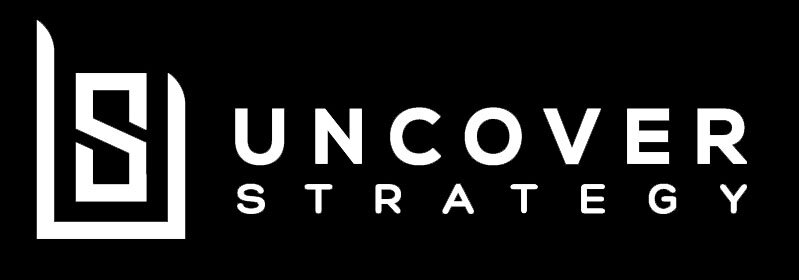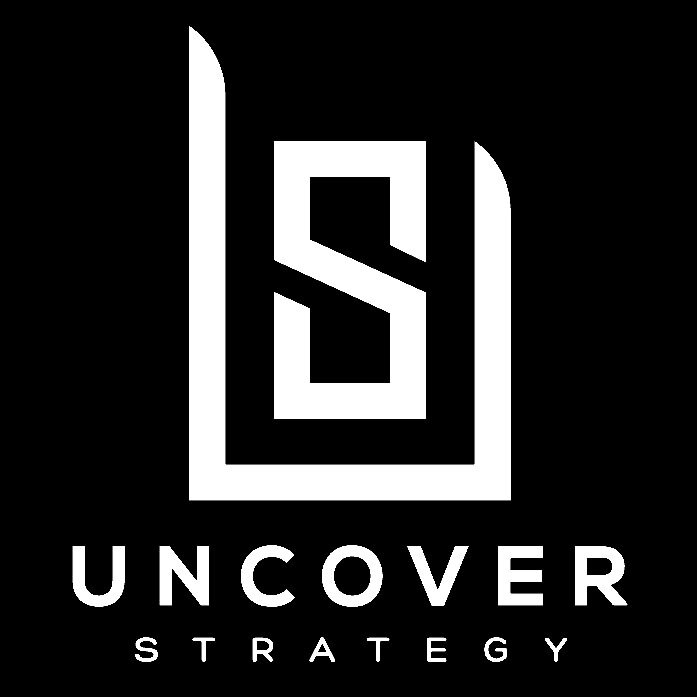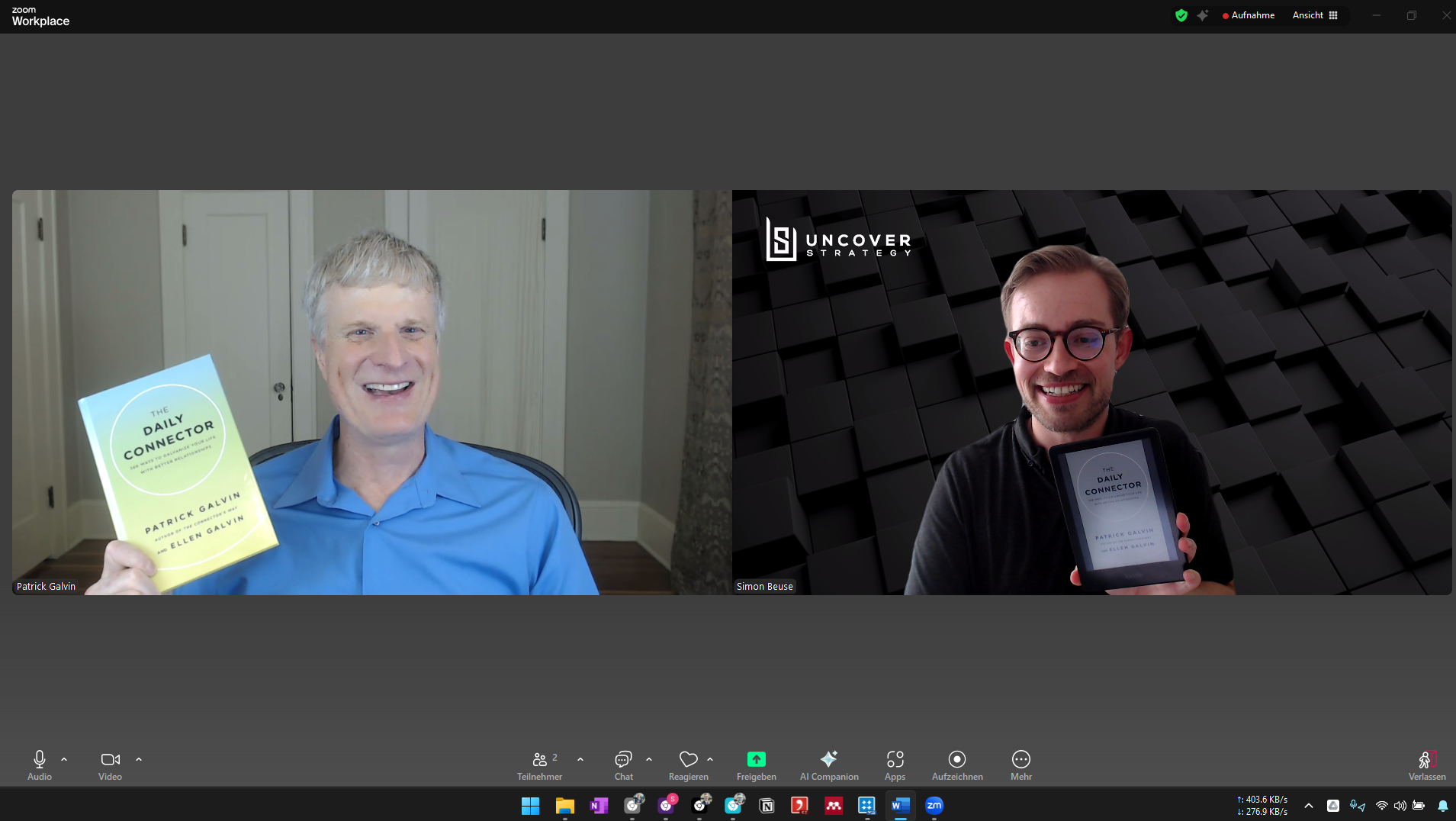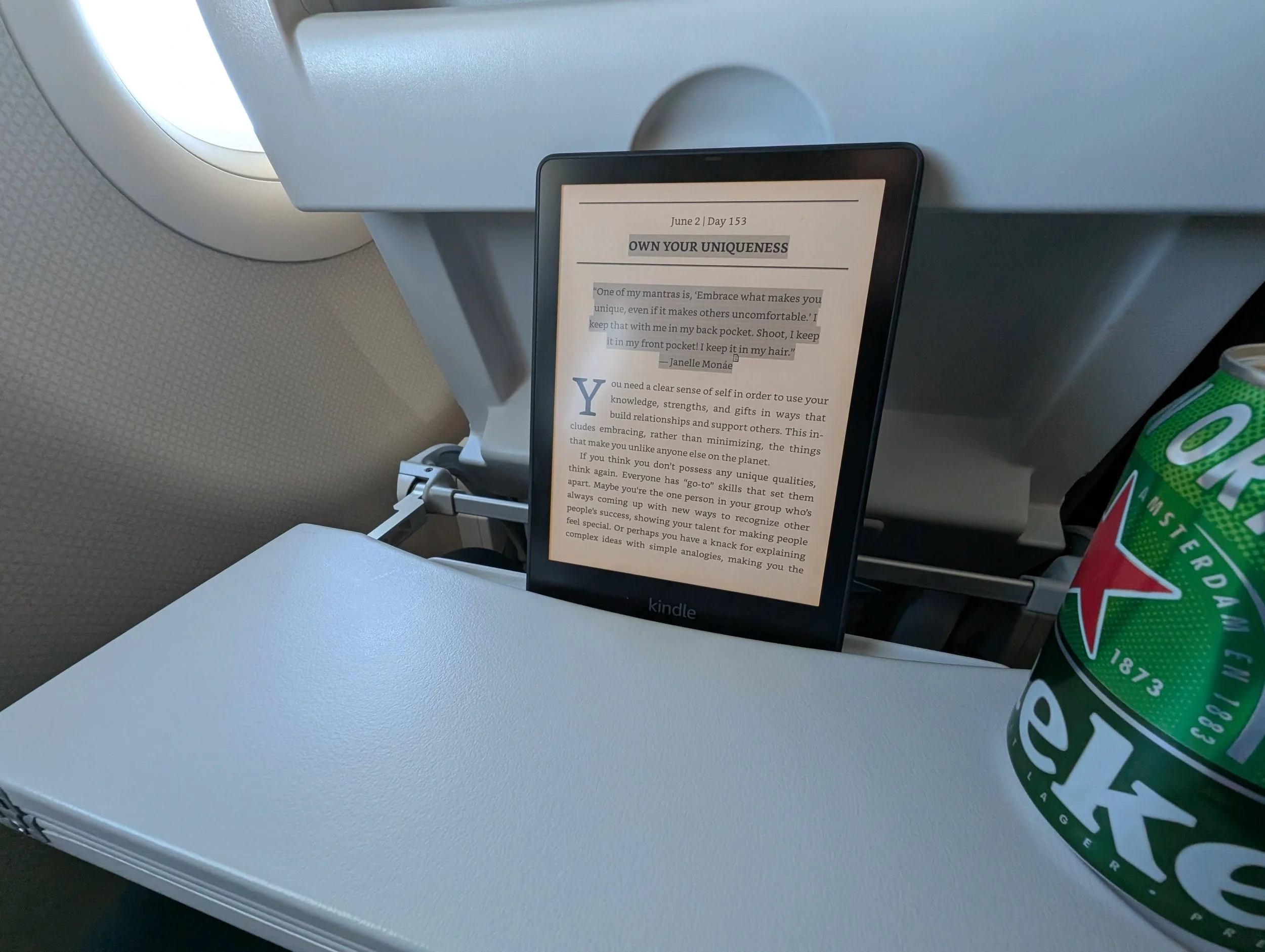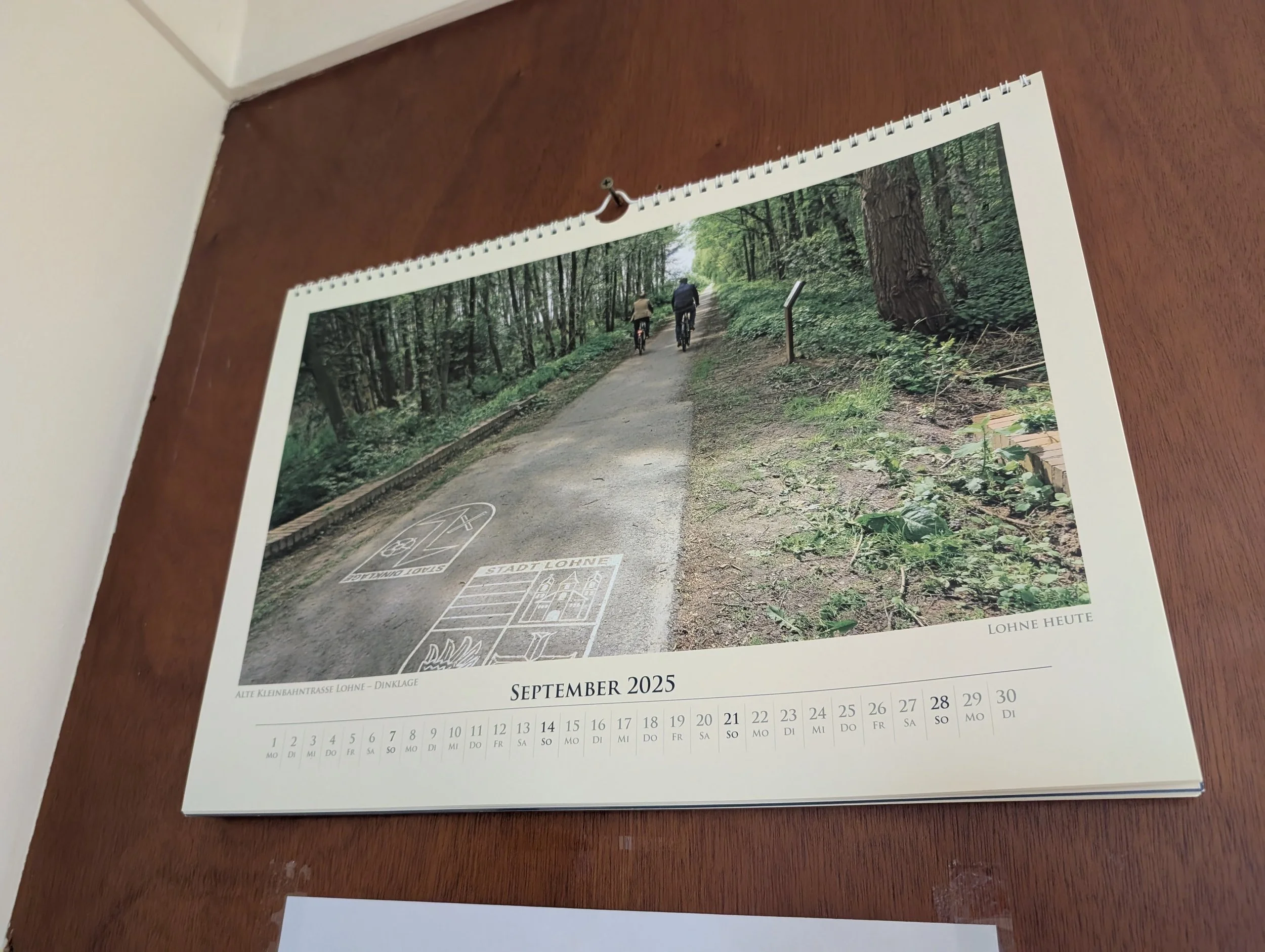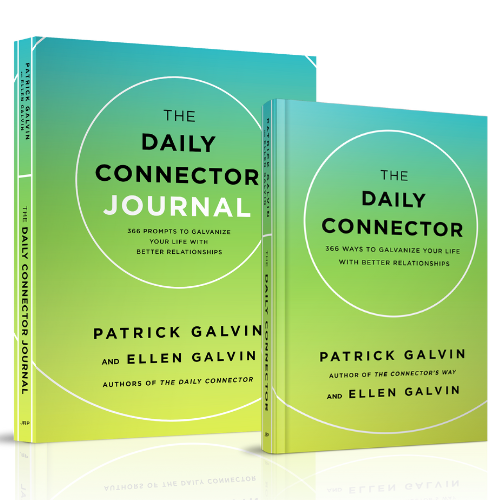The Founder’s Guide to Building Real Connections (Without Burning Out)
Real connections.
“Relationship building is not rocket science. It’s an essential mindset and a skill set that anybody can master.”
A few weeks ago I sat down with Patrick Galvin, author of The Connector’s Way, The Trusted Way, and The Daily Connector. What started as a casual Zoom call years ago after I first reached out to Patrick for a quote for a past blogpost, quickly became one of the most energizing conversations I’ve had this year.
We talked about startup burnout, boundaries, asking for favors, and why startup founders often overlook their most strategic asset:
Relationships.
Source: Simon Beuse, 2025
Founders: You're Not Too Busy for Relationships (You're Just Not Prioritizing Them)
Most startup advice focuses on product, pitch decks, and growing quickly. And while this is certainly a huge part of your work, Patrick reminded me, it’s rarely the best product that wins.
Even in the Angel Investment group I’m part of, AngelLoop, we talk about the “Jockey and the Horse.” Rightfully or not, investors often bet on the Jockey (the founder) over the Horse (the product or idea), because the Horse will almost certainly change.
“There are many businesses with decent products that succeed wildly because the founder is a good relationship builder.”
We got stuck in the founder tunnel: Build. Pitch. Hire. Repeat.
But when you zoom out, you realize that many pivotal startup moments come from a message. Meeting someone. Being referred to someone. Knowing someone.
Simon Story: My Yellow Volkswagen Moment
Patrick mentioned the yellow Volkswagen effect. If somebody asks you how many yellow Volkswagens you’ve seen recently, you can’t recall any. But after you’ve been asked this question, you’ll start noticing yellow Volkswagens everywhere.
Reading Patricks book on the plane to China (alongside… well you know).
Source: Simon Beuse, 2025
It reminded me of being in Silicon Valley earlier this year. I had just flown around the world for a startup sprint. I was home in Germany for Christmas, and yes, Christmas at home in the cold hits different than in Australia, but then had to fly to Brisbane to catch a pre-booked flight back to San Francisco.
Amsterdam to Doha. Ho Chi Minh City. Brisbane. San Francisco. (I know this route does not make sense but if I take too much time trying to explain myself now you won’t be reading any further.)
At one of the events in SF, we met a developer.
Nice guy. Good chat. But we didn’t need him.
Two weeks later, we did.
He joined the team.
That’s social capital. It rarely looks urgent, but it often ends up critical.
The 10:1 Rule | Give Before You Post
→ Featured in The Daily Connector, Entry for March 3rd
My favorite concept from The Daily Connector is the 10:1 rule.
In the book, Patrick says:
Before you promote yourself once, do 10 things for others.
That could be:
Writing a LinkedIn recommendation unprompted
Sharing someone’s work privately
Sending a podcast link they’d love
Dropping a quick encouragement note
Connecting two people quietly behind the scenes
Importantly, this does not have to be public-facing.
“Social capital works like a bank. You can’t withdraw what you haven’t deposited.”
And as a founder, you know this is true. Stop thinking your startup doesn’t have time for it. It’s too important not to. The good thing is: You also don’t need to do this for 1,000 people. (More on that in “Start With One Conversation.”)
“Not Now” Is Better Than “No”
Referenced in The Daily Connector, Entry for January 17th
One thing I’ve struggled with: saying no. I always want to help people, and I often can.
Source: freepik.com, 2025
But doing too much took a toll on me last year. So I started promoting the concept of “JOMO” more intentionally (Joy of Missing Out).
Patrick reframed this issue beautifully:
“Say no in a way that builds the relationship.”
Saying no with intention still signals respect. Saying nothing leaves people hanging. You are not closing the door, you’re keeping it open for the right moment.
And only if you say yes and can commit to that project are you earning respect.
My (Simon) Hack That Helped Me Say No
→ Referenced in The Daily Connector, Entry for January 17th
Near the end of my PhD I put a sticky note on my desk:
"Say no to everything that’s not necessary."
People would ask for quick favors. I wanted to say yes, and help, but instead, I’d point to the note.
It worked better than expected.
“NO” is now my default answer (I wish!).
Source: Simon Beuse, 2025
Joining a Mastermind (Or At Least a Group Chat)
Another useful point Patrick brought up: “Startups need masterminds. Or mentors. Or just someone outside their chaos.”
I myself meet too many solo founders trying to do everything without support. You can’t AI your way out of this one.
Yes, I know it’s easy to talk to ChatGPT. It feels human. It’s even the number one therapeutic use case now. I get it.
But it’s not real.
You need humans. A group of six to eight is enough.
Talk about wins and failures. Help each other avoid mistakes you don’t need to make yourself. It makes the journey easier and more enjoyable.
Because in the end, just like my PhD, your work often will not be a sprint. It will be a marathon.
Start With One Conversation
Don’t start 100 conversations. You don’t need to.
Painfully generic advice will tell you to 10x your LinkedIn content. But that leads straight to burnout.
You need to be selective. So start with one.
Build a system. Patrick uses HubSpot as his CRM tool. I’ve used spreadsheets and reminders. Use whatever works.
“The best CRM is the one you actually use.”
Track follow-ups. Set reminders. Don’t let your best relationships fall through the cracks.
One tip Patrick shared: always write down a “next step” after a conversation. Even if you don’t follow up right away, it gives you context and momentum.
The Best Time to Start Isn't January 1
→ Referenced in The Daily Connector introduction and Entry for Day 1
What I think is great about The Daily Connector is that it starts when you do. No calendar reset needed. Pick up the book. Start on Day 1. Every daily entry includes a relationship-building idea and action step. Then, you can use its accompanying The Daily Connector Journal to answer one question related to the entry, which will increase the likelihood that you’ll put the idea into action.
This isn’t about building 366 habits.
When I started, I realized my morning routine already had too many steps. If I added one more, I’d never get out of my apartment, let alone write this post.
So I picked one practice. For example, I really liked the 10:1 rule.
That’s all you need.
My “Lohne” calendar at home (a calendar showcasing my home city in pictures). I didn’t really “start” using it until a few days ago when I returned.
Source: Simon Beuse, 2025
Final Thought: Connection Is a Startup Skill
Soft skills are no longer soft. And connection, even in the age of AI, is not fluff.
It’s become even more important.
Think of it: how many LinkedIn posts are painfully generic? You can tell when the person didn’t care. It’s a template and the formatting is pointing you out.
You scroll past.
But if you know someone, if you met them, it changes your entire connection.
Your next investor, hire, or co-founder might be one message away.
Make time for relationships. Even when you’re busy.
TLDR for Startup Founders
Relationships are strategic assets
Use the 10:1 rule before self-promotion
Say no with intention and clarity
Track your best connections and follow up
One powerful relationship can change everything
Patrick’s Rapid Fire Answers
I started ending interviews with a few quick hits. Here’s what Patrick shared:
Most unexpected connection: He met a CEO on a buffet line at an association’s Christmas party. Now that CEO’s company is his biggest client.
Favorite page in the book: Rather than a single page, he feels the book’s central theme is the most important: becoming a great connector is a mindset and skill set that anybody can master.
Person he admires most for connection (non-famous): His father, who passed away at 92, who people remembered as “an encourager” at his memorial service.
Best tool for tracking relationships: HubSpot. With notes and action steps after each conversation.
Whats next?
Source: Patrick and Ellen Galvin, (You can buy the book and journal directly from Amazon here (US-site))
Want to build better connections?
Start with The Daily Connector and The Daily Connector Journal. For information on how to purchase in print, Kindle, and audio formats, visit this site.
Want to discuss building a relationship ritual into your startup? Or just want to chat about your own practice?
You know where to find me.
Thank you again, Patrick. Looking forward to meeting your co-author and life partner Ellen soon, and hopefully welcoming you to Brisbane one day for a TEDx talk.
– Simon
